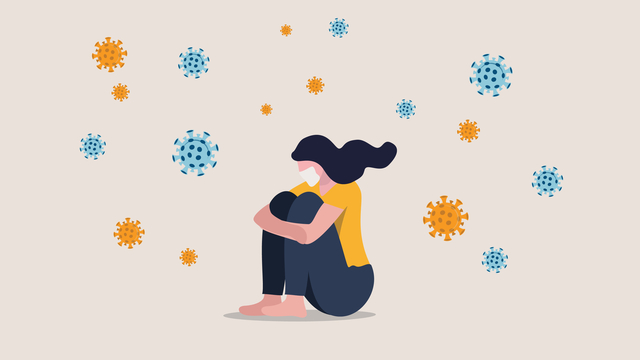Since the beginning of the coronavirus outbreak in March 2020, prevalence of anxiety and depression has been increased or even doubled. Among others, isolation, loss of income and fear are triggering mental health conditions or exacerbating existing ones. Still, many people may be facing increased levels of alcohol and drug use, insomnia, and anxiety.
People’s behavior may greatly affect the pandemic’s dynamic by altering the severity, transmission, disease flow, and repercussions. As a result, it is normal and understandable that people are experiencing fear in the context of COVID-19. According to World Health Organization:
The COVID-19 pandemic has disrupted or halted critical mental health services in 93% of countries worldwide while the demand for mental health is increasing, according to a WHO survey. Faced with new realities of working from home, temporary unemployment, home-schooling of children, and lack of physical contact with other family members, friends and colleagues, it is important that we look after our mental, as well as our physical, health.
In light of the outbreak situation, WHO conducted a survey from June to August 2020 among 130 countries across WHO’s six regions. It evaluates how the provision of mental, neurological and substance use services has changed due to COVID-19, the types of services that have been disrupted, and how countries are adapting to overcome these challenges.
Countries reported widespread disruption of many kinds of critical mental health services:
- Over 60% reported disruptions to mental health services for vulnerable people, including children and adolescents (72%), older adults (70%), and women requiring antenatal or postnatal services (61%).
- 67% saw disruptions to counseling and psychotherapy; 65% to critical harm reduction services and 45% to opioid agonist maintenance treatment for opioid dependence.
- More than a third (35%) reported disruptions to emergency interventions, including those for people experiencing prolonged seizures; severe substance use withdrawal syndromes; and delirium, often a sign of a serious underlying medical condition.
- 30% reported disruptions to access for medications for mental, neurological and substance use disorders.
- Around three-quarters reported at least partial disruptions to school and workplace mental health services (78% and 75% respectively).
History has shown that the mental health impact of disasters outlasts the physical impact, suggesting today’s elevated mental health need will continue well beyond the coronavirus outbreak itself. For example, an analysis of the psychological toll on health care providers during outbreaks found that psychological distress can last up to three years after an outbreak. What is more, the 1918 flu pandemic led to reduced educational attainment, higher rates of physical disability, and lower income for individuals who were in utero during the pandemic, suggesting there may even be intergenerational effects.Concequently, it is likely that the mental health fallout from the COVID-19 pandemic will continue to grow.
Following the above, Psychologist and mental health expert Jean-Pierre van de Ven noted that there is an increased sense of loneliness, consumption of alcohol and drugs, anxiety and depression. Meanwhile, COVID-19 itself can lead to neurological and mental complications, such as delirium, agitation, and stroke, as WHO stated.
At the same time, people with pre-existing mental, neurological or substance use disorders are also more vulnerable to SARS-CoV-2 infection ̶ they may stand a higher risk of severe outcomes and even death.
According to a study by the Dutch Association of Mental Health and Addiction Care (GGZ), the number of individuals with psychological issues in 2020 increased by 30-60% compared to the previous year. In addition, another study published in the International Journal of Public Health said that mental health issues due to the feeling of loneliness during the pandemic would result in an increase of €2 billion in health expenditures.
Good mental health is absolutely fundamental to overall health and well-being. COVID-19 has interrupted essential mental health services around the world just when they’re needed most. World leaders must move fast and decisively to invest more in life-saving mental health programmes during the pandemic and beyond.
… Dr Tedros Adhanom Ghebreyesus, Director-General of the World Health Organization noted.
How to enhance mental health and wellbeing amid COVID-19 pandemic
- Connect with others, help and support them
- Keep active and eat well
- Learn how to manage panic and anxiety, for example by meditating
- Ask for help when struggling with worry or stress
- Learn how to cope with and manage difficult feelings
- Maintain a good sleep routine
- Take regular breaks from, and set limits on, social media and online information intake
- Contact a mental health support service
- Set goals and plan to keep mentally well
- Do enjoyable things and keep an active mind
- Relax and focus on the present
- Spend time outside, or bring nature in
- Drink less alcohol































































